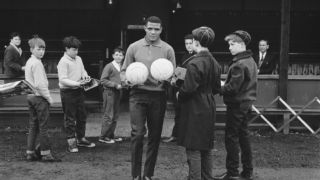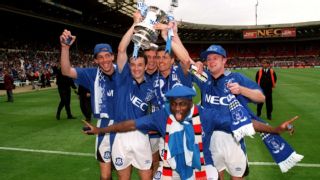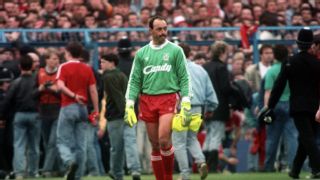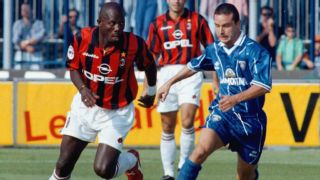Either Riyad Mahrez or Isaac Success will add their name to the list of African FA Cup winners on Saturday, when Manchester City and Watford clash in the 138th final of the world's oldest domestic club competition.
African players have written their own unique chapters and made memorable contributions in the competition, with some of the continent's finest players having clinched the historic silverware.
Back in the day
The continent's relationship with the showpiece fixture in the English football calendar began in 1953, and while that final 'belongs' to the great Stanley Matthews, the match is even remembered as the 'Matthews final' for his hat-trick, it was also the first time an African player won the cup.
South Africa-born Bill Perry netted the winner for Blackpool as they defeated Bolton Wanderers 4-3 at Wembley, with the right-sider meeting a Matthews cross to fire home a 92nd-minute winner as the Tangerines came back from 3-1 down.
Perry, who died in 2007, won three England caps and would later return to his homeland to play with Johannesburg Rangers.
While Perry was Africa's pioneer in the competition, it would be another 33 years before another of the continent's stars would get his hands on the cup.

In the interim, Leeds United wideman Albert Johanneson became the first black player to feature in the final when he took to the field as part of Don Revie's great side in 1965, despite suffering an injury against Birmingham City in a league game that same week.
The Whites were defeated 2-1 by Bill Shankly's Liverpool, and 'The Black Flash' Johanneson left Leeds by the time they did win the cup in 1972.
The South African, also nicknamed 'Hurry Hurry,' had been a key figure as Leeds were promoted to the First Division in 1965, but injuries continued to take their toll and he died in 1995, at 55, after an extended battle with alcoholism.
WHERE: Wembley Stadium, London (capacity 90,000)
WHEN: Saturday; noon ET, 5 p.m. UK (live on ESPN+)
It would be another 30 years - until Nigeria's Daniel Amokachi with Everton in 1995 - before a black African player won the competition, although recently deposed Brighton & Hove Albion manager Chris Hughton, a Republic of Ireland international with a Ghanaian father, was twice a winner with Tottenham Hotspur in 1981 and 1982.
Despite his physical prowess, Amokachi never truly realised his potential in the English game, although he remains fondly remembered among Everton fans for his unforgettable double against Spurs during the 1995 semi-final after he took the decision to 'substitute himself' into the match.

During the 1970s, the only African interest in the final came in 1979, where defeated finalists Manchester United boasted Ipswich-born goalkeeper Gary Bailey, who was raised in South Africa.
Grobbelaar's dominance
In 1986, Zimbabwe goalkeeper Bruce Grobbelaar won the first of his three FA Cups with Liverpool, to become the first African winner since Perry in 1953.
Grobbelaar was present between the sticks as Everton were dispatched in 1986 and 1989, and Sunderland were beaten in 1992, during trophy-laden years for the stopper at Anfield.
The '89 final, however, was overshadowed by events in the semifinal, when 96 Liverpool supporters lost their lives during the tragic Hillsborough Stadium disaster.
"It was tough to go on after that, but what made the difference is that Kenny Dalglish, who was our manager at the time, made us go and visit the families of the bereaved," Grobbelaar told FIFA in 2016.
"We counselled them and, in turn, we counselled ourselves.
"After beating Nottingham Forrest, we qualified for the final and it was fitting that it was again against local rivals Everton, as the whole city was grieving. We won 3-2."

Amokachi's success in 1995 wasn't the first time that a player of Nigerian origin had won the cup, with John Fashanu - an England international whose father is a Nigerian barrister - part of the Wimbledon side that so heroically defeated Grobbelaar's Liverpool in the 1988 final.
Coventry City's John Salako, another Nigerian who represented England at senior level, was also a defeated finalist in 1990, as was the late Ugo Ehiogu, with Aston Villa, a decade later.
While Ceuta-born Nayim's victory with Tottenham Hotspur in 1991 is the closest the Maghreb has come to producing a winner - at least unless Mahrez's City win on Saturday - tiny Liberia has produced two winners, the smallest African nation to do so.
Christopher Wreh's time at Arsenal may have ended in disappointment, but he lifted the cup as part of Arsenal's double-winning team in 1998, before his compatriot, and current Liberia president, George Weah was a winner with Chelsea two years later, during the latter stages of his storied career.
A new era
The new Millennium prompted a significantly greater influx of African players into the English game as football's geo-politics changed, and as such, the continent's stars enjoyed much greater success in the FA Cup.
Since Weah and Celestine Babayaro were winners with Chelsea in 2000, there has only been one final, in 2014, with no African participation, and only three more without an African winner. Although, France U-21 international Yaya Sanogo, who remains eligible for the Ivory Coast, was part of the Arsenal team that won in 2015.

Africa's FA Cup successes in the last decade were localised primarily within two teams; Arsene Wenger's Arsenal, and Chelsea, where Jose Mourinho infused the Blues with an African spine.
Lauren, an Invincible in 2003-04, won the FA Cup in 2002, 2003 and 2005, while Kolo Toure and Nwankwo Kanu each won two winner's medals with the Gunners.
Kanu would return to the final on two further occasions, memorably winning with Portsmouth alongside John Utaka, Sulley Muntari and Papa Bouba Diop in 2008, before being a defeated finalist in 2010.
By the turn of the decade, Chelsea were arguably at their peak, even though Mourinho had departed, and '10 represented Didier Drogba's third success in the competition.
No African player has won more than the Ivorian's four cups, and no player in the English game can touch his record of having scored in four separate finals.
The striker was a winner alongside Michael Essien, John Obi Mikel, and Salomon Kalou as Chelsea defeated Manchester United in 2007.

That match - played only six days after the end of the Premier League season in which United had beaten Chelsea to the title by six points - appeared to be meandering towards penalties.
But Drogba, in the 116th minute, burst past Rio Ferdinand and Wes Brown after a quickfire exchange with Frank Lampard, and poked the ball past Edwin van der Sar.
However, FA Cup successes in the last decade didn't belong entirely to Arsenal and Chelsea; Eric Djemba-Djemba, for all the criticism that comes his way, was a winner with United in 2004, while Mohamed Sissoko and Djimi Traore were victors with Liverpool two years later.
Yaya Toure
While Drogba may have been influential in winning four FA Cups between 2007 and 2012, those triumphs came after Chelsea had already won back-to-back Premier League titles in 2005 and 2006, and the Pensioners were no strangers to success.
By contrast, when Manchester City faced Stoke City in the 2011 final, they hadn't won silverware for 35 years - their longest spell without honours.

The wait would end at Wembley, when Yaya Toure's left-footed drive in the 74th minute settled a frustrating final and set City on their way to the many glories that have followed.
Until that point, the ambitious Manchester outfit were yet to demonstrate any tangible successes following the eye-watering investment of Khaldoon Al Mubarak, and had been dismissed as "all talk" by Sir Alex Ferguson, yet Toure had finally served up their first real success.
Two years later, however, Yaya was on the losing side when City were defeated by Wigan Athletic, featuring his compatriot Arouna Kone, only the fourth time that players representing the same African nation had crossed paths in the final.
In recent years, Nigerians have enjoyed the greatest success in the competition, with Alex Iwobi an unused substitute in 2017, when Mohamed Elneny did see some action for the Gunners, and Victor Moses winning the crown with Chelsea a year later.
The 2018 victory represented redemption of sorts for Moses, who had been shown a red card after 68 minutes of the previous final.

